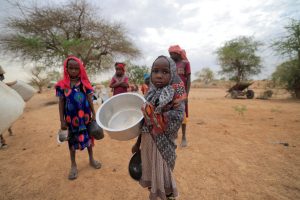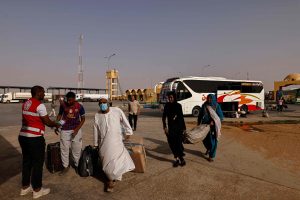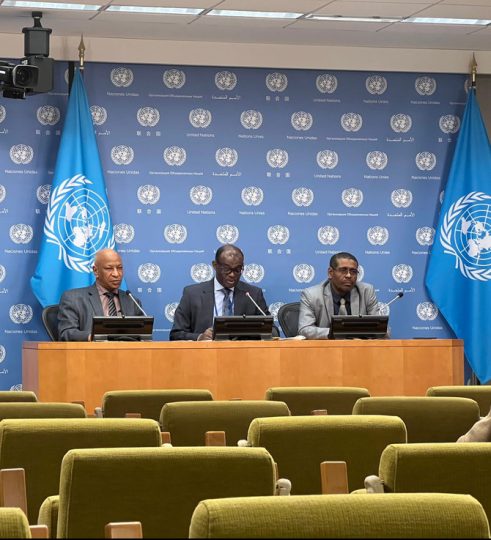*Ambassador Al-Harith Idriss Al-Harith Mohamed said that while Sudan’s armed forces has the security situation under control, people are fleeing and there is an urgent need for humanitarian aid
The government of Sudan has the security situation under control even as civilians and refugees are fleeing the fighting to neighboring countries and are in need of urgent humanitarian assistance, says Sudan’s ambassador at the UN, Al-Harith Idriss Al-Harith Mohamed.
Speaking at a press conference at the UN on Friday, Mohamed said that the “rebellion” by the Rapid Support Forces, or RSF, a group of heavily armed militias, had failed to take control of the country.
He said that the government and its armed forces had the upper hand in the current fighting, had not declared a state of emergency, and communication had not been disrupted.
Week-long peace talks in Saudi Arabia between the two factions had failed to end the conflict and produce a permanent cease-fire as of late Thursday. This was despite a declaration of principles signed in Saudi Arabia, which has led recent efforts to mediate between the two factions.
Several UN and international efforts to arrange a cease-fire between the two factions have failed to take hold since the fighting began.
Heavy gunfighting and air strikes were heard by Khartoum residents on Thursday.
Al-Harith said that women and children were suffering in the main cities and at border crossings.
“The humanitarian condition is bad,” he said.
According to the UN health agency, the death toll from the clashes in Sudan has risen to at least 604 people, including civilians.
Al-Harith said that there was an urgent need for clean water, food, mobile clinics and financial assistance for those who were crossing into neighboring countries.

A Sudanese girl who fled the conflict in Sudan’s Darfur region and newly arrived, carries a pot on her way to a water point near the border between Sudan and Chad while seeking refuge in Goungour, Chad May 12, 2023. REUTERS/Zohra Bensemra
He said that the Sudanese armed forces had complied with international laws and treaties in allowing civilians to leave war zones and cross the borders and had kept ports open for shipping and receiving.
“The government of Sudan is committed to ensure the safety and security of the foreign diplomats and foreign nationals in Khartoum as well as the safety of humanitarian personals,” he said.
Fighting began in Sudan on April 15 — between the regular army led by General Abdel Fattah Al-Burhan and the RSF forces headed by Mohamed Hamdan Dagalo, known as Hemedti. The later attacked army barracks in an attempt to dislodge military leaders from power days before an internationally backed plan to transition power in Sudan to a civilian government.
To deal with the crisis, the exodus of refugees and shortages of supplies, Al-Harith said that a high-level committee for humanitarian aid had been formed that included government bodies to oversee aid and relief operations in close cooperation with national civil society groups.

Passengers fleeing war-torn Sudan cross into Egypt through the Argeen Land Port on May 12, 2023. (AFP)
He said that the newly formed committee would be coordinating its efforts with UN relief agencies and other international aid organizations.
Al-Harith said that Sudan’s permanent mission at the UN was in constant contact with the UN leadership to facilitate humanitarian aid and diplomatic efforts to contain the situation.
He said that there were plans to communicate with donor countries, especially the Arab Gulf countries and the US, to arrange for aid to alleviate the current crisis.
The war has led to more than 200,000 people fleeing the country with an estimated 800,000 people expected to cross into bordering states.
Many UN and international agencies have suspended their work in the capital Khartoum and other main cities and moved to the Red Sea city of Port Sudan to coordinate relief efforts. ARABNEWS




